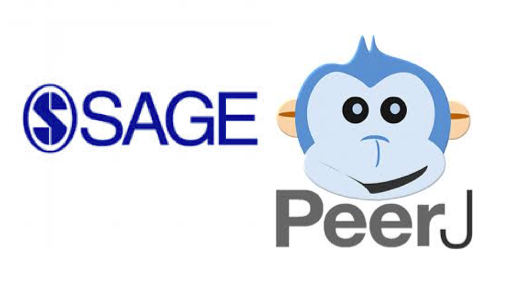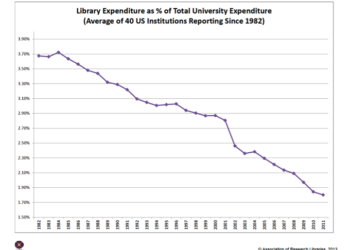On July 9, SAGE announced that it had “led a new investment as part of a second round of funding for PeerJ,” an open access publisher that relies for its revenue on membership fees and editorial services provided by authors rather than on subscription fees or article-based publishing charges. According to the press release, “David McCune, non-Executive Director of SAGE, will now sit on the PeerJ Board of Directors alongside Tim O’Reilly, CEO and founder of O’Reilly Media, and PeerJ’s two co-founders, CEO Jason Hoyt and Publisher Peter Binfield.” The announcement goes on to explain that this move is in keeping with SAGE’s general interest in innovative publishing models and its larger strategy of seeking “to foster a healthy and diverse publication ecosystem.”

The press release sparked quite a bit of interest and conversation among observers of the scholarly publishing scene, so I sent a few questions to David Ross, SAGE’s Executive Publisher for Open Access.
Scholarly Kitchen: For those of our readers who don’t know, can you tell us a little about what Series A investment means?
Ross: Series A refers to a start-up’s first round of significant funding in which partners other than founders or angel investors are offered preferred stock in return for capital to enable ongoing development or expansion.
SK: Did SAGE work in tandem with O’Reilly to put up this funding, or did you just do the same thing independently at roughly the same time?
Ross: Until now SAGE has had no direct relationship with Tim O’Reilly but his involvement certainly influenced our decision. Tim has been an innovative publisher for decades and his seminal contributions in the areas of tech information transfer, the open-source movement, the maker movement, and tech investing are immensely impressive.
When PeerJ launched we were intrigued by the innovative new business model and David McCune, non-Executive Director of SAGE, was personally very impressed by both the concept and the fact that O’Reilly Media had provided seed money.
SAGE also had an ongoing relationship with Jason Hoyt and Pete Binfield – Pete worked for SAGE before he joined PLOS prior to launching PeerJ with Jason, and we have kept in touch – so we when we heard that PeerJ had decided to seek further investment to expand the company it seemed a natural partnership.
SK: This investment a gives SAGE a chair on the PeerJ Board of Directors. What other benefits do you see arising for your company from this move?
Ross: SAGE is always interested in innovation and was keen to support PeerJ. As a minority stakeholder, we have no involvement in the strategic direction or the day-to-day running of the company beyond David [McCune]’s role as a board member. PeerJ remains wholly independent. What we hope is that this investment will foster a closer relationship in which both SAGE and PeerJ can draw on each other’s experience as we try and develop the OA market. There may also be some synergies with regard to technological development. PeerJ has developed a state of the art, end-to-end OA publishing system based on open-source software and SAGE is in the process of developing our own systems and processes to support our growing OA program, so there may be opportunities to work together there, but it is very early days.
SK: What is it about the PeerJ model that piqued SAGE’s interest?
Ross: We believe that different solutions will be required for different disciplines and different author needs as the OA market develops. While it is clear that in biomedicine, for example, there can be a viable business model driven by high APCs funded through large direct research grants, it is difficult to see how that model could be applied to disciplines with low levels of funding. We envision that in those disciplines, and specifically in the humanities and social sciences, there will be multiple revenue streams that support OA publications. PeerJ’s model addresses that by developing an entirely new revenue source through its membership model.
SK: What are your plans for the future in regard to PeerJ? Is this investment more in the nature of an experiment, or is it a step in a specific strategic direction for SAGE?
Ross: This is a small minority stake only, taken to provide support to an innovative new company. We hope to be able to share experiences and work together to try and develop the OA landscape. PeerJ’s strategic direction and development plans remain entirely in their hands.
SAGE is both an early adopter and a strong advocate of open access, so the PeerJ partnership makes sense for us as one way to help foster a healthy and diverse publishing ecosystem. We are developing a number of journals to build on the success of some of our STM offerings such as the Orthopaedic Journal of Sports Medicine (published in association with the American Orthopaedic Society of Sports Medicine) and SAGE Open – the first broad spectrum journal aimed specifically at the social and behavioral sciences and the humanities. Just recently we have launched two more OA titles in the social sciences, Big Data & Society and Research & Politics and more will follow in the coming months.
The OA market it still developing and SAGE is deeply engaged in understanding how academic publishing is evolving. By supporting PeerJ, we have the opportunity learn from and engage with something really new and different in the industry.
Discussion
21 Thoughts on "Q&A with SAGE’s David Ross about PeerJ Investment"
It might be fun to ask David Ross how PeerJ plans to make a profit that pays SAGE some dividends. That plan is a mystery at this point given the present unsustainable pricing structure. On the other hand PeerJ’s fast publishing system appears to be getting rave reviews from submitting author’s, at least according to PeerJ’ Twitter feed. Maybe SAGE can use it. Beyond that I agree that OA is probably mostly a matter of market segmentation.
It will be interesting to see if PeerJ continues its very vocal disdain for subscription journal publishers (https://peerj.com/librarians/), now that one such publisher is paying PeerJ’s bills.
SAGE is pushing toward open access. I assume their PeerJ investment is part of that push. I certainly don’t expect to see Binfield and Hoyt’s disdain of subscriptions (= paywalls) diminish.
BTW., note that their negative comments are regarding subscription journals, not their publishers. An important distinction, as a single publisher can have both paywalled and OA journals.
For what it’s worth, calculating from this page (http://www.sagepub.com/oa/journals.cp) around 3.6% of Sage’s 700 journals are fully OA.
Not an impressive proportion, to be sure. Is it easy to tell what proportion of their articles are in the OA journals? For example, I don’t know whether SAGE Open is unusually voluminous.
In saying that SAGE is pushing towards OA, I was thinking more of stuff like We are delighted to partner with a publisher that has been such an early advocate for open access publishing. For example, SAGE formed a partnership with Hindawi Publishing Corporation in 2007, and was also a founding board member of OASPA in 2008.
I don’t think SAGE Open is that huge–looking at their archives page, around 150 articles published total so far in 2014. Like you though, I tend to think of SAGE as being very active in the OA arena and wanted to get a sense of where they stood. OUP for example just launched (I believe) our 19th fully OA journal, which puts us at around 6.3% of our program–would one then argue that we’re pushing toward OA twice as fast as SAGE? We were also an early mover, converting a subscription journal to fully OA back in 2005 (Nucleic Acids Research) which has been a resounding success.
To me, the area where SAGE is taking the lead is trying to figure out how to do OA in the humanities where the usual Gold/APC model doesn’t work well. That, I’m assuming is a big reason for the investment here, to get a backstage view of the finances as a new model for OA is tested, to see if it could translate into other areas.
Mike, I think that testing may be a better term than pushing for what OUP is doing. I think every major publisher is testing the APC market.
Yes; but not every publisher was a founding board member of OASPA.
Still, I don’t want to make a big deal of this. I’m not out to portray SAGE as OA Pioneers just because they bought a small stake in PeerJ. I’m certainly not claiming for them OA-at-the-roots mentality that motivates the PeerJ founders.
Given the venture capital investments behind PeerJ and its for-profit nature, I might suggest that there are more motivations at play here beyond the OA-at-the-roots mentality of some of the founders.
Sorry, I really can’t figure out what you’re implying here. Beyond a reminder that PeerJ (unlike PLOS) is a for-profit, I mean. What else did you mean?
That the motivations behind PeerJ are more than just philosophical. There’s a monetary motivation as well. Nothing wrong with that but worth recognizing that unlike not-for-profits run for the benefit of the research community, profiting off of that community is a key reason for PeerJ’s existence. This makes it a very different beast from other OA publishers like PLOS. There are stakeholders here expecting a significant return and that may affect policy and business decisions.
Yes. Your point is well made and well taken. There is certainly something comforting about PLOS’s well-defined mission, and in one sense it’s a shame that PeerJ lacks that. On the other hand, it’s probably good for the diversity of the dedicated-OA publishing ecosystem that it’s inhabited by both non-profits and for-profits.
David C, any idea what percentage of OUP articles is OA, as opposed to journals? I would not be surprised to see 10% as the ultimate OA market segment, but this is not a prediction, far from it.
What is a non-Executive Director?
I don’t know — maybe David will comment and explain.
The governance structures of companies vary. In the SAGE context: SAGE is an independent company majority owned by the founder and Chair, Sara Miller McCune. David McCune is a minority shareholder, sits on the non-Executive Board and provides broad strategic oversight and governance. He does not have a day to day operational role.
The phrase you sometimes see is “non-executive Chairman,” to signal that the Chairman is not involved with day-to-day operations. Presumably the “non-executive Director” phrase is to indicate that McCune will not interfere with operations. So this is likely a way of saying that Sage did NOT acquire PeerJ.



